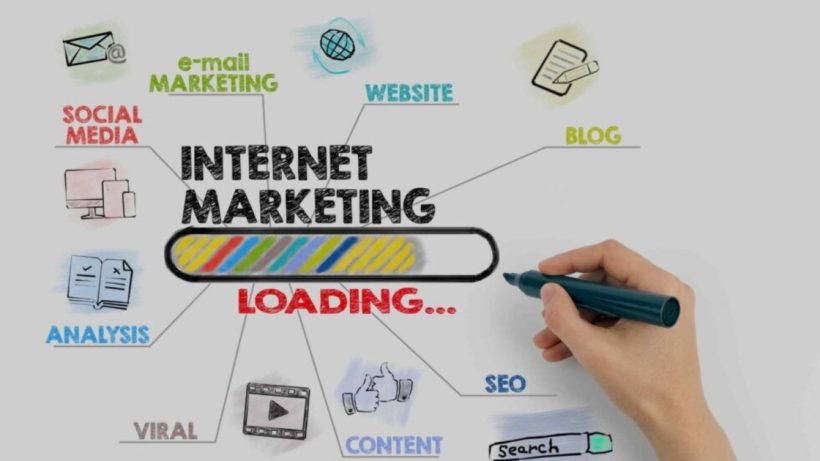Internet marketing, also known as online marketing or digital marketing, encompasses all the techniques used to promote goods and services on the Internet. With more than half of the world’s population now using the internet, it is no surprise that businesses are increasingly relying on online channels to reach their target audience. Internet marketing offers a range of opportunities for businesses of all sizes to connect with potential customers, increase brand awareness, and drive sales.
In today’s hyper-connected world, businesses must have an effective online presence if they want to succeed. A well-executed Internet marketing strategy can help a business stand out in a crowded market and attract new customers.
Explaining the concept of Internet marketing
Internet marketing, also known as online marketing, is a broad term that encompasses any promotional activity conducted via the Internet. It encompasses a wide range of strategies including social media campaigns, email marketing campaigns, search engine optimization (SEO), pay-per-click advertising (PPC), content marketing, and more.
The goal of Internet Marketing is to reach the right audience at the right time with the right message. By leveraging various digital channels, marketers can target their ideal customers using specific demographics such as age, gender, and location. They can also track and measure their campaigns’ effectiveness in real time with analytics tools.
One of the main advantages of Internet Marketing is its ability to allow businesses to connect with potential customers on a global scale without having to spend exorbitant amounts of money on traditional advertising methods like TV commercials or print ads. With millions of people accessing the internet daily through mobile devices or laptops/desktops, it’s becoming increasingly important for businesses to incorporate digital marketing into their overall strategy if they want to remain competitive in today’s market.
Importance of Internet marketing: Highlighting the benefits and advantages
One of the most significant benefits of Internet marketing is its ability to target a specific audience. Through search engine optimization (SEO) and pay-per-click (PPC) advertising, businesses can reach their intended demographic based on factors such as location, interests, and browsing behavior. This targeted approach can result in higher conversion rates and ROI compared to traditional marketing methods.
Another advantage of Internet marketing is the ability to measure and analyze performance metrics. With tools such as Google Analytics, businesses can track website traffic, engagement rates, and conversion rates in real time. This data allows for informed decision-making regarding marketing strategies and budget allocation.
Finally, internet marketing offers a level playing field for businesses of all sizes. Unlike traditional advertising methods that favor larger corporations with bigger budgets, internet marketing tactics such as social media advertising and email campaigns are affordable and accessible to small businesses. This democratization of advertising has allowed for more competition in various industries while also providing consumers with more options to choose from.
Also Read: Johnson & Johnson Baby Powder Lawsuits: Holding Corporations Accountable for Consumer Safety
Different forms of internet marketing: Discussing SEO, PPC, social media marketing, etc.
Search engine optimization (SEO) is a form of internet marketing that focuses on improving the visibility and ranking of a website in search engine results pages. This is done by optimizing website content, using relevant keywords, building backlinks, and ensuring that the site adheres to search engine guidelines. SEO can be both on-page (optimizing content within the website) and off-page (building external links).
Pay-per-click (PPC) advertising involves placing ads on search engines or other websites and paying each time someone clicks on an ad. These ads typically appear at the top of search engine results pages or in designated areas of websites. Advertisers bid for specific keywords that are relevant to their business, which determines how much they pay per click.
Social media marketing involves promoting products or services through social media platforms such as Facebook, Instagram, Twitter, Pinterest, etc., to increase brand awareness and generate leads. This includes creating engaging content that resonates with your target audience, using targeted advertising campaigns to reach specific demographics, and leveraging user-generated content to build trust with potential customers. Social media marketing can also involve influencer partnerships or collaborations with other brands for increased exposure.
Strategies for effective Internet marketing: Tips on creating a successful campaign
One of the most important strategies for effective Internet marketing is creating a clear and concise message that resonates with your target audience. This means understanding your target market’s needs, preferences, and pain points. Conducting thorough market research can provide valuable insights into what drives consumer behavior, which can help you tailor your messaging to meet their needs.
Another key strategy is to ensure that all elements of your campaign are cohesive and consistent. This includes everything from brand messaging and imagery to website design and social media content. Consistency helps build trust with your audience and reinforces your brand’s identity.
Finally, it’s important to track and analyze the performance of your campaign regularly. By measuring key metrics like website traffic, conversion rates, and social media engagement, you can identify areas where improvements can be made and adjust your strategy accordingly. These insights will help you continually refine and optimize your internet marketing campaigns for maximum effectiveness.
Measuring success in Internet marketing: Metrics to track and use for analysis
In the world of Internet marketing, measuring success is essential to ensure that your efforts are paying off. There are several metrics that you can track and use for analysis to see how well your campaigns are performing. These include website traffic, conversion rates, bounce rates, click-through rates (CTR), and cost per acquisition (CPA).
Website traffic is a crucial metric to track as it indicates how many people are visiting your website. Conversion rates show how many visitors take action on your site, such as making a purchase or subscribing to your newsletter. The bounce rate measures the percentage of visitors who leave after viewing only one page on your site.
Click-through rate shows how often people click on links in your emails or ads while CPA tracks the cost of acquiring a customer through advertising channels like Google AdWords or social media platforms like Facebook.
By monitoring these metrics regularly and analyzing them thoroughly, you can make data-driven decisions to optimize your internet marketing campaigns and achieve better results in the long run.
Future of internet marketing: Predictions and Trends for the Industry
Firstly, the future of Internet marketing is predicted to be more personalized and targeted. With the help of artificial intelligence (AI) and machine learning algorithms, businesses will be able to collect vast amounts of customer data and analyze it in real-time to create hyper-targeted marketing campaigns. This will enable them to deliver personalized content that speaks directly to each individual’s needs and preferences.
Secondly, voice search optimization is expected to play a significant role in internet marketing in the coming years. As more people use smart speakers like Amazon Echo or Google Home for search, businesses will need to optimize their content for voice queries. In addition, as virtual assistants become more sophisticated, they are likely to start offering product recommendations based on user’s search history, which could open up new possibilities for targeted advertising.
Finally, video content is expected to continue its dominance as a powerful tool for engaging audiences online. With platforms like YouTube and Instagram TV continuing their rise in popularity among consumers, brands will need to invest in creating high-quality video content that tells their story effectively while still being entertaining and engaging. Overall, the future of Internet marketing looks set to be an exciting one with plenty of opportunities and challenges ahead.
Also Read: rajkotupdates. news: pubg developer krafton has filed a lawsuit against garena free fire
Conclusion:
In conclusion, internet marketing is a crucial aspect of any business that wants to stay competitive in today’s digital world. The key points to take away from this discussion include the importance of having a comprehensive online presence, the need for targeted and effective SEO strategies, and the value of social media in building brand awareness and engaging with customers.
One significant benefit of Internet marketing is its ability to level the playing field for small businesses that may not have large advertising budgets. With the right approach, even small businesses can reach a wider audience and compete with larger companies. Additionally, internet marketing offers greater flexibility and accessibility compared to traditional forms of advertising such as print or television ads.
Overall, it is clear that Internet marketing plays an integral role in modern business practices. Its significance cannot be overstated as more people continue to rely on digital channels for information and communication. By embracing different online platforms and implementing effective strategies, businesses can effectively promote their products or services while also building strong relationships with customers.















